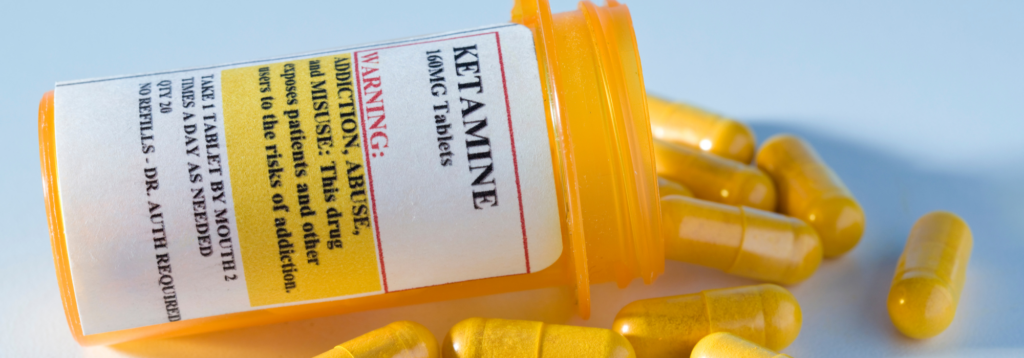Blog

What is Ketamine?
Ketamine (ketamine hydrochloride) is a dissociative anesthetic with some hallucinogenic effects, meaning it distorts perceptions of sight and sound and makes the user feel disconnected from their environment and any pain.1 It has one-tenth the potency of PCP, and its original use is as an injectable, short-acting anesthetic for use in humans and animals.5 Ketamine can induce a state of sedation (feeling calm and relaxed), immobility, relief from pain, and amnesia (no memory of events while under the influence of the drug).1 It can be used for the induction (the transition from an awake to an anaesthe-tized state) of general anesthesia as a pre-anesthetic to other general anesthetic agents.2
Potential Therapeutic Use
Studies from Yale research labs showed that ketamine triggers “glutamate production,” which can prompt the brain to form new neural connections. This makes the brain more adaptable and able to create new pathways, giving patients the opportunity to “develop more positive thoughts and behaviors.” This was an effect that had not been seen before, even with traditional antidepressants.4 For the last two decades, researchers at Yale have led ketamine research by experimenting with using small doses of ketamine delivered intravenously in controlled clinical settings for patients with severe depression who have not improved with standard antidepressant treatments. In several studies, more than half of participants (who felt other antidepressant medications were ineffective) showed a significant decrease in depression symptoms after just 24 hours. The study states that ketamine “needs to be part of a more comprehensive treatment plan.”4 Studies are continuing to explore the possibilities of ketamine in therapeutic settings. It is not unlikely to assume that as ketamine gets clinically used, it will unfortunately also be under threat of being abused or misused.
Ketamine Misuse
Much like its intended use, ketamine can be misused recreationally for its ability to produce dissociative sensations and hallucinations. In 2022, the American Addiction Centers reported that nonmedical misuse is relatively low, with 0.7% of the U.S. population using it illegally.6
Since ketamine can be used in powdered form, it has been known to be snorted as a “party drug” at festivals or rave events.3 The street name for ketamine is “K” or “Special K.”
Ketamine has also been used to facilitate sexual assault because of its hallucinogenic effects known to make the user feel disconnected from their surroundings. A number of individuals have abused this drug or have been instrumental in others using this drug as a “date-rape” drug.1
Recreational use of ketamine can result in a number of internal complications including:
- gastrointestinal issues;
- depression;
- respiratory problems and;
- amnesia
Serious debilitating urinary tract symptoms are also seen frequently in those individuals who abuse ketamine.3 A study on ketamine in the National Institutes of Health predicts that ketamine toxicity and addiction “pose significant risks to a small segment of the population, and given increasing utilization, the prevalence of these phenomena is expected to increase.5” As ketamine use increases both recreationally and clinically, it will continue to be a substance worth testing for.
USDTL Testing
As an innovative leader offering alcohol and other drug testing, we understand the importance of being able to test when it is most feasible for your organization. We offer extended panel testing for ketamine in alternative specimens including hair, nail, urine, and umbilical cord tissue.
References:
- USDTL’s Integration and Partnership With CourtFact
- New Year, New Capabilities: Offering Forensic & Clinical Testing Options
- Weather Delay
- The Detection of Delta-9-tetrahydrocannabinol, Delta-8-tetrahydrocannabinol, Delta-10-tetrahydrocannabinol, and Cannabidiol in Hair Specimens
- Umbilical Cord Tissue Testing for Ketamine
- Drugs of Abuse: A DEA Resource Guide (2024)
- Beyond THC and CBD: Understanding New Cannabinoids
- New Xylazine, Psilocin, Gabapentin, Dextromethorphan, and Extended Cannabinoids Testing at USDTL
- January 2026 (3)
- October 2025 (1)
- July 2025 (3)
- May 2025 (2)
- April 2025 (2)
- March 2025 (2)


